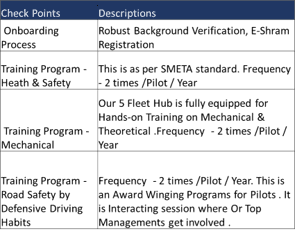LOGISTICS
The Importance of Driver Well-being: Enhancing Safety and Productivity
26 Sep 2023, 4 MINUTE READ
The Importance of Driver Well-being: Enhancing Safety and Productivity
The logistics industry serves as the lifeblood of the Indian economy, driving the country’s GDP to a remarkable 13-14%(according to the Economic Survey 2021). With over 22 million people employed within its far-reaching domain, it stands tall as one of the most prominent job creators in the nation.
Within this dynamic sector are the unsung heroes, the drivers, who accelerate the logistics industry's gears, guaranteeing the seamless flow of products and trade across the country.
The Unsung Heroes
India has a vast geography, and drivers play a significant role in ensuring smooth transportation of goods and materials across the country, even to remote and rural areas. According to the Indian Logistics Market Report 2022-2027, the logistics market was valued at 14.08 Trn in 2021. It is expected to expand at a CAGR of 14.14% from 2022 to 2027. This growth will create a demand for more drivers, as the industry will need to hire more people to meet the increased demand for transportation services.
During the COVID-19 pandemic, truck drivers emerged as valiant ‘corona warriors’ for delivering essential lifesaving medical and household supplies. The trucker’s profession, however, is very demanding, with challenges like, e.g., irregular shifts, long trips without adequate rest, hostile working conditions, unaddressed health issues, etc. Fatigue and insufficient sleep continues to be a well-documented occupational health concern among truckers plying on long-distance routes.
Beyond health issues, the inattention to the well-being of truck drivers has also been an increasing concern for the trucking industry. In addition to strenuous and tiring working conditions, truck drivers face inconveniences due to improper road infrastructure and inadequate safety and resting facilities on the highways. The fragmented structure of the trucking industry in India, coupled with insufficient sporadic funding support and unavailability of large-scale strategic programs targeted at the comprehensive health and well-being of truck drivers, are some of the major challenges of this profession.
There is an urgent need for sustained commitment and support towards the health and well-being of truckers. Opportunities must be worked on wherein stakeholders partner strategically to mitigate the hardships faced by the trucker community while ensuring that the overall viability of the supply chain and logistics sector is further enhanced.
A holistic approach is required to delve into four aspects. Namely,
- Wayside Amenities- Resting & food + facilities
- Training/Skill upgradation
- Social Security & Empowerment
- Digital Ease & Efficiency
Empowering Our Strongest Asset: Our Drivers
Our drivers are at the core of our operations. They are the leaders on the road, helping put our words into action. Our commitment to driver welfare is evident through a range of comprehensive initiatives aimed at enhancing driver competence, minimising risks, and creating a supportive work environment.
Cashless Operations
- Digitised payments for fuel, toll and self-maintenance to our drivers ensure that shipments reach the customer ahead of time.
Training & Monitoring
- Polygon geo-fencing at drivers houses for effective vehicle tracking & max visibility
- An extensive training module covering truck maintenance & operation
Driver Care
- All routes planned keeping the location of driver’s homes in mind
- Regular health checkups & provision of healthy food at subsidised rates
Guardian App
- Offers training videos at identified milestones to reinforce the right protocol
- A video/voice message notifying the driver & the control tower in case of speeding, tailgating, etc.
Additionally, our drivers undergo a comprehensive Defensive Driver Course as part of our commitment to prioritising safety and efficiency in our operations.The course is designed to equip our drivers with the necessary skills, knowledge, and mindset to handle various challenging scenarios on the road while prioritising safety for themselves and others.

For upskilling, we invite OEMs to train our drivers on upgraded vehicle platforms BS4/BS6 and the preventive maintenance involved. Maintenance team also conducts training on specialist topics, e.g., tyres/suspension, etc.
Changing Times
The last few years have seen a shift in the focus towards logistics, with truck drivers coming under the spotlight. The large amount of spends allotted towards building Multi-modal Logistics Parks across India at strategic locations, will ensure drivers are taken care of when it comes to getting adequate amount of rest through their long-distance hauls as well as basic amenities like food, parking, repair & recreation.
Another change coming into place is the requirement for all truck cabins to be air conditioned by 2025. We are definitely seeing a paradigm shift in the approach towards making Driver comfort and well-being a priority. There is support for all kinds of activities that are influencing drivers' conditions and well-being. The realisation that if drivers are rested, satisfied, and feel safe, they are more willing to work and fulfil their needs & at the same time also fulfil business goals has sunk in.
Emphasis on comprehensive training programs, promoting a culture of safety, and providing opportunities for professional development, are key to ensure that our drivers are equipped with the necessary skills and knowledge to navigate the challenges of the industry, ultimately fostering a safer and more productive logistics ecosystem.
Related Insights
LOGISTICS
3PL vs 4PL: What You Need to Know to Choose the Best Option?
30 Apr 2025, 6 MINUTE READ
LOGISTICS
Understanding Integrated Logistics: Key Concepts and Advantages
10 Apr 2025, 4 MINUTE READ
LOGISTICS
How to Avoid Delays and Penalties in Road Freight Services?
3 Mar 2025, 6 MINUTE READ
LOGISTICS
Strategic Vehicle Distribution: Enhancing Accessibility Across Key Hubs
6 Jan 2025, 4 MINUTE READ
LOGISTICS
Transporting Traditions: The Logistics of Seasonality During Festivals
7 Nov 2024, 5 MINUTE READ
Drive efficiencies throughout your supply chain with our technology-enabled services
View Services